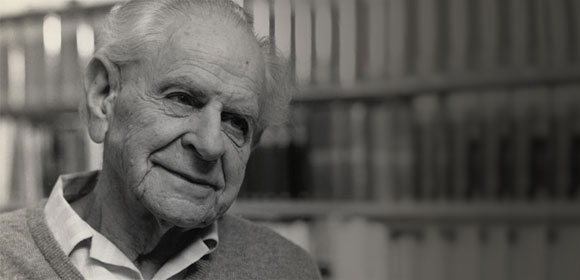Karl Popper
Sir Karl R. Popper (1902-1994) was an Austro-British philosopher. Popper was a Fellow of the Royal Society and of the British Academy. He is considered one of the most influential philosophers of science of the 20th century.

Notable Contributions
- Critical rationalism
- Falsificationism
- Active Darwinism
- Cosmological pluralism

- Open society
Sourced
Popper, K. (1959). The Logic of Scientific Discovery. London: Hutchinson & Co.
According to my proposal, what characterizes the empirical method is its manner of exposing to falsification, in every conceivable way, the system to be tested. Its aim is not to save the lives of untenable systems but, on the contrary, to select the one which is by comparison the fittest, by exposing them all to the fiercest struggle for survival.
Now it is far from obvious, from a logical point of view, that we are justified in inferring universal statements from singular ones, no matter how numerous; for any conclusion drawn in this way may always turn out to be false: no matter how many instances of white swans we may have observed, this does not justify the conclusion that all swans are white.
My view may be expressed by saying that every discovery contains ‘an irrational element’, or ‘a creative intuition’, in Bergson’s sense. In a similar way Einstein speaks of the ‘search for those highly universal laws . . . from which a picture of the world can be obtained by pure deduction. There is no logical path’, he says, ‘leading to these . . . laws. They can only be reached by intuition, based upon something like an intellectual love (‘Einfühlung’) of the objects of experience.’
Those among our theories which turn out to be highly resistant to criticism, and which appear to us at a certain moment of time to be better approximations to truth than other known theories, may be described, together with the reports of their tests, as ‘the science’ of that time. Since none of them can be positively justified, it is essentially their critical and progressive character – the fact that we can argue about their claim to solve our problems better than their competitors – which constitutes the rationality of science.
Popper, K. (1978). Three Worlds. The University of Michigan. ![]()
There is the physical universe, world 1, with its most important sub-universe, that of the living organisms. World 2, the world of conscious experience, emerges as an evolutionary product from the world of organisms. World 3, the world of the products of the human mind, emerges as an evolutionary product from world 2. In each of these cases, the emerging product has a tremendous feedback effect upon the world from which it emerged.
The feedback effect between world 3 and world 2 is of particular importance. Our minds are the creators of world 3; but world 3 in its turn not only informs our minds, but largely creates them.
The creation of new ideas, of new theories, is partly non-rational. It is a matter of what is called ‘intuition’ or ‘imagination’. But intuition is fallible, as is everything human. Intuition must be controlled through rational criticism, which is the most important product of human language. This control through criticism is the rational aspect of the growth of knowledge and of our personal growth.